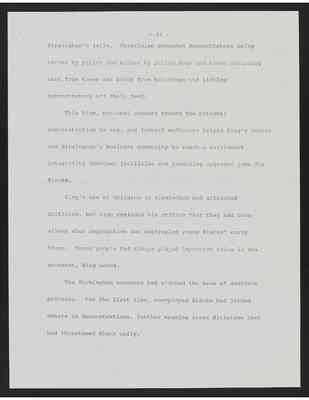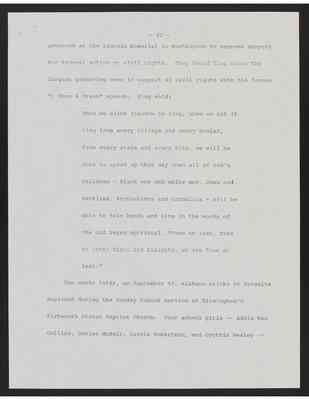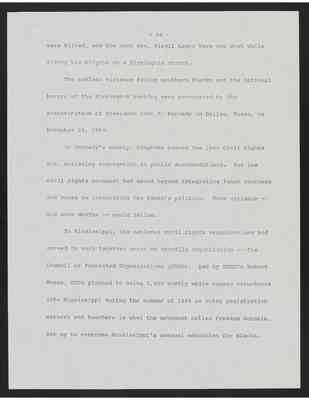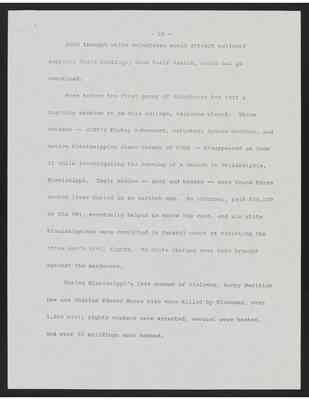Pages
21
Birmingham's jails. Television recorded demonstrators being beaten by police and bitten by police dogs and hoses stripping bark from trees and brick from buidings and lifting demonstrators off their feet.
This time, national concern forced the national administration to act, and federal mediators helped King's forces and Birmingham's business community to reach a settlement integrating downtown facilities and promising upgraded jobs for Blacks.
King's use of children in Birmingham had attracted criticism, but King reminded his critics that they had been silent when segregation was destroying young Blacks' eary lives. Young people had always played important roles in the movement, King noted.
The Birmingham movement had widened the base of southern protests. For the first time, unemployed Blacks had joined others in demonstrations, further erasing class divisions that had threatened Black unity.
22
The Birmingham protests gave encouragement to Blacks throughout the United States. An explosion of nation-wide civil rights activity quickly followed. The southern civil rights movement had come North.
But the South remained the chief focus, and events kept the movement's attention focused on the South. Another wave of violence swept the region -- bombs, beatings, shootings, and arrests.
On June 11, 1963 Alabama Governor George C. Wallace publicly blocked the entrance of two Black students to the University of Alabama, while privately surrendering to a previously made secret arrangement to integrate the school. The next night, following a nation-wide television address by President Kennedy on the "moral crisis" the nation faced in confronting segregation and racism, a sniper shot and killed Medgar Evers, Mississippi NAACP State Field Secretary, in the driveway of his Jackson home.
On August 28, 1963, over 250,000 Americans, Black and white,
23
gathered at the Lincoln Memorial in Washington to express support for federal action on civil rights. They heard King close the largest gathering ever in support of civil rights with his famous "I Have A Dream" speech. King said:
When we allow freedom to ring, when we let it ring from every village and every hamlet, from every state and every city, we will be able to speed up that day when all of God's children - Black men and white men, Jews and Gentiles, Protestants and Catholics - will be able to join hands and sing in the words of the old Negro spiritual, "Free at last, free at last; thank God Almighty, we are free at last."
Two weeks later, on September 15, sixteen sticks of dynamite exploded during the Sunday School service at Birmingham's Sixteenth Street Baptist Church. Four school girls --Addie Mae Collins, Denise McNair, Carole Robertson, and Cynthia Wesley --
24
were killed, and the next day, Virgil Lamar Ware was shot while riding his bicycle on a Birmingham street.
The endless violence facing southern Blacks and the national horror at the Birmingham bombing were punctuated by the assassination of President John F. Kennedy in Dallas, Texas, on November 22, 1963.
In Kennedy's memory, Congress passed the 1964 Civil Rights Act, outlawing segregation in public accommodations. But the civil rights movement had moved beyond integrating lunch counters and buses to integrating the South's politics. More violence -- and more death - would follow.
In Mississippi, the national civil rights organizations had agreed to work together under an umbrella organization -- the Council of Federated Organizations (COFO). Led by SNCC's Robert Moses, COFO planned to bring 1,000 mostly white summer volunteers into Mississippi during the summer of 1964 as voter registration workers and teachers in what the movement called Freedom Schools, set up to overcome Mississippi's unequal education for Blacks.
25
COFO thought white volunteers would attract national support; their beatings, even their deaths, would not go unnoticed.
Even before the first group of volunteers had left a training session at an Ohio college, violence struck. Three workers -- CORE's Mickey Schwerner, volunteer Andrew Goodman, and native Mississippian James Cheney of CORE -- disappeared on June 21 while investigating the burning of a church in Philadelphia, Mississippi. Their bodies -- shot and beaten -- were found three months later buried in an earthen dam. An informer, paid $30,000 by the FBI, eventually helped to solve the case, and six white Mississippians were convicted in federal court of violating the three men's civil rights. No state charges ever were brought against the murderers.
During Mississippi's 1964 summer of violence, Henry Hezikiah Dee and Charles Edward Moore also were killed by Klansmen, over 1,000 civil rights workers were arrested, several were beaten, and over 30 buildings were bombed.




